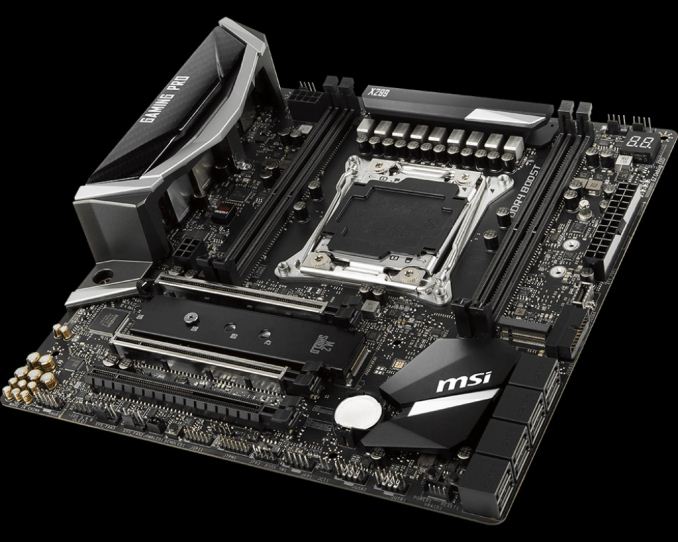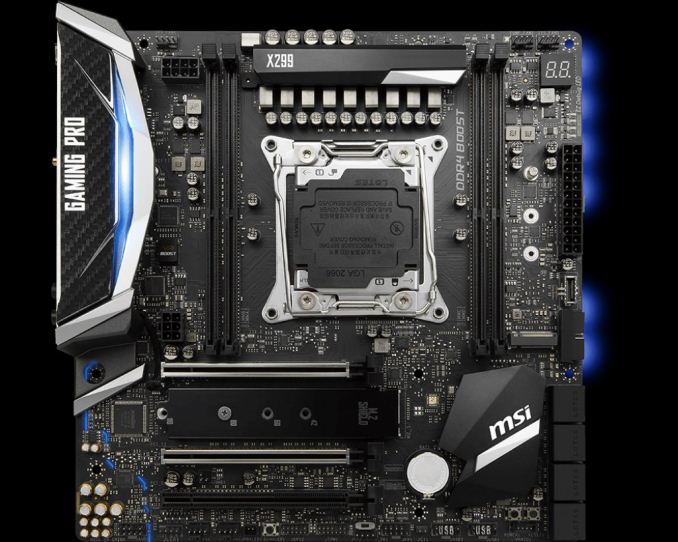The MSI X299M Gaming Pro Carbon AC Motherboard Review
by Joe Shields on March 22, 2018 9:00 AM EST- Posted in
- Motherboards
- MSI
- MicroATX
- X299
- Basin Falls
- Skylake-X
- Gaming Pro Carbon
Conclusion
For the price of the MSI X299M Gaming Pro Carbon AC, there are a number of boards in direct competition. They all have slightly differing feature sets: the MSI board has a smaller x-y footprint, but gives up four DRAM slots as a result. This differentiation should be easy to make depending on the consumer in question - do you focus on size? How much memory do you need?
The MSI X299M Gaming Pro Carbon does have a lot of features we are used to seeing on full-sized boards, including multiple M.2 slots and eight SATA ports. The board also includes USB 3.1 (10 Gbps) support on the back panel and internal header controlled by the ASMedia ASM3142 chip. LAN duties are handled by an Intel I219-V or I211-AT, both known performers, while wireless duties are also handled by an Intel-AC 8265. Control over the 9-phase VRM is managed by a respected IR (now Infineon) IR35201 8-channel controller to ensure accurate voltage is delivered to the processor.
The overall build quality on the MSI X299M Gaming Pro Carbon AC felt good - everything was securely in place out of the box. This had a benefit, as the VRM heatsink, though mounted well on both sides, was by far the warmest running we have seen in our testing, topping out at 95C while overclocked at 4.5 GHz. While this result is within its operating range, I would absolutely suggest active cooling, especially while overclocking. When I added a small (40mm) fan to blow across it, temperatures dropped to around 79C, much more acceptable. The heatsink just doesn't have enough mass or surface area to get rid of the heat created by an overclocked 140W processor (no prizes for guessing what a 165W processor would do when overclocked). That aside, about the only other thing I would like to see improved on this board is the M.2 shield. While it is effective at cooling M.2 devices, we are seeing more robust solutions from other partners.
Performance from this board was overall good. MSI's MCE on this board was not as aggressive as we have seen from the other full-size MSI boards tested. To that end, the X299M Gaming Pro Carbon AC was in the middle to above top half of the pack in nearly every benchmark. Its worst performance came with boot times where the three MSI boards took the longest to boot around 30 seconds or slightly more, as well as a slight downturn in our 4K gaming. When we overclocked the board, we found to reach a similar temperature limited clock speed of 4.6 GHz matching the previous board but falling short of the 4.7 GHz we achieved on the X299 Gaming 7 Pro. I do not believe this to be a fault of the board, however, as in both cases it seemed to be temperature limited.
In the end, the MSI X299M Gaming Pro Carbon AC is going to have most of the features an enthusiast needs. Be it for gaming, or productivity, this diminutive board will have a user covered with modern USB 3.1 (10 Gbps) ports, the latest audio codec, multi-GPU support, and multiple M.2 ports. The only things it is really lacking is a U.2 port (which few use anyway), and a more beefy VRM heatsink to keep those power bits cooler.
This board's direct competition outside of its own product stack is the EVGA X299 Micro. We mentioned a few differences earlier, such as the number of USB ports and the number of SATA ports. A major differences between the two are the U.2 on the EVGA, the dual M.2 ports on the MSI (compared to one), the dual networking on the MSI (compared to one) and also the differing CPU support. While the EVGA offers users the ability to run both Kaby Lake-X and Skylake-X CPUs, the MSI board focuses on Skylake-X only. To MSI's credit, this restriction has allowed them to focus more on the Skylake-X features without worrying about Kaby Lake-X at all.
Other AnandTech Reviews for Intel’s Basin Falls CPUs and X299
- The Intel Skylake-X Review: Core i9-7980XE and Core i9-7960X Tested
- The Intel Skylake-X Review: Core i9-7900X, i7-7820X and i7-7800X Tested
- The Intel Kaby Lake-X Review: Core i7-7740X and i5-7640X Tested
- Intel Announces Basin Falls: The New High-End Desktop Platform and X299 Chipset
- ($480) The ASUS Prime X299-Deluxe Review [link]
- ($400) The GIGABYTE X299 Gaming 7 Pro Review [link]
- ($390) The ASRock X299E-ITX/ac Review [link]
- ($390) The ASRock X299 Professional Gaming i9 Review [link]
- ($370) The ASUS Strix X299-XE Gaming Review [link]
- ($366) The MSI X299 Gaming M7 ACK Review [link]
- ($308) The MSI X299 Gaming Pro Carbon Review [link]
- ($340) The ASUS X299 TUF Mark 1 Review [link]
- ($330) The EVGA X299 FTW-K Review [link]
- ($305) The MSI X299M Gaming Pro Carbon AC (this review)
- ($290) The EVGA X299 Micro Review [link]
- ($290) The ASRock X299 Taichi Review [link]
- ($260) The MSI X299 Tomahawk Arctic Review [link]
- ($232) The MSI X299 SLI Plus Review [link]












14 Comments
View All Comments
eek2121 - Thursday, March 22, 2018 - link
You guys should pay closer attention to the quality of MSI motherboards. Especially how buggy their UEFI/BIOS is. For instance, 6 BIOS releases in a row on my x399 had bugs like overclocking values not saving unless you hit enter, broken fan profiles that didn't work, etc.halcyon - Friday, March 23, 2018 - link
Agreed. Have a Z370 MSi board and the UEFI/BIOS is a far cry from Asus or Asrock...Joe Shields - Tuesday, March 27, 2018 - link
I can only report on what I tested and my experiences in testing them. I did not experience any of those issues in my testing time.hansmuff - Thursday, March 22, 2018 - link
Thank you for pointing out the terrible heatsink. In this price class, IMHO that makes it a no-go.gammaray - Thursday, March 22, 2018 - link
is there a point in buying that platform when the 8700k is king of gaming?mkaibear - Friday, March 23, 2018 - link
There are plenty of points in buying that platform. It makes for excellent workstations, the added parallelism over an 8700K makes it worthwhile if you're doing anything reasonably threaded but requiring decent single-core performance as well.Of course Threadripper has taken a chunk of the workstation space higher up, so there's less of a point than there was when it was launched, but not everyone only does gaming on their system.
(also if you are using a system for content creation or compiling at home, and you need a large number of cores but still want a system which will have decent performance in the latest games, there's a use case in there too)
But yes, if you want a pure gaming system then you'd go for one of the core iX-8x00s.
(I wouldn't go for an 8700k purely for gaming to be honest, I'd go for an i5-8400 probably and spend the extra money on a better graphics card)
PeachNCream - Friday, March 23, 2018 - link
MSI is marketing this motherboard for gaming which is explained in the product name X299M Gaming Pro Carbon AC. It makes the question being asked a valid one.mkaibear - Friday, March 23, 2018 - link
I didn't question the validity of the question. I merely answered it!My Angle - Thursday, March 22, 2018 - link
Thanks for sharing the informative information through the article. and all the details are awesome and good in this post.http://ludokinggames.com
MDD1963 - Friday, March 23, 2018 - link
Would there be some advantage paying about $600-$800 extra for an X299/7900X- based gaming system over a Z370/8700K system? For gaming? Only thing even more silly is TR4/1950X....